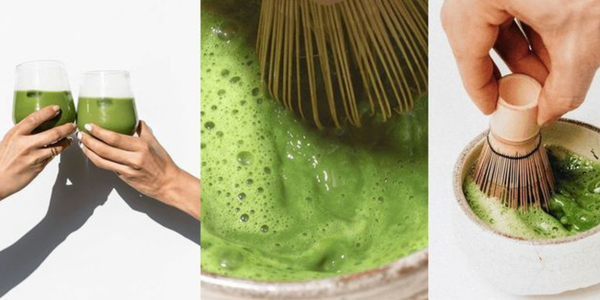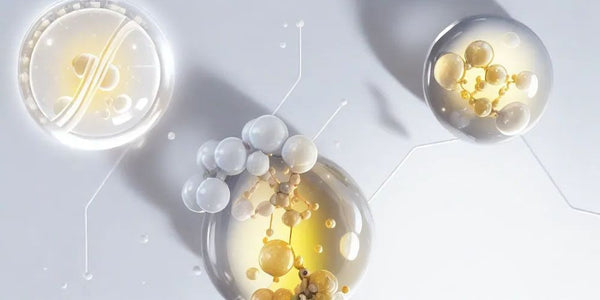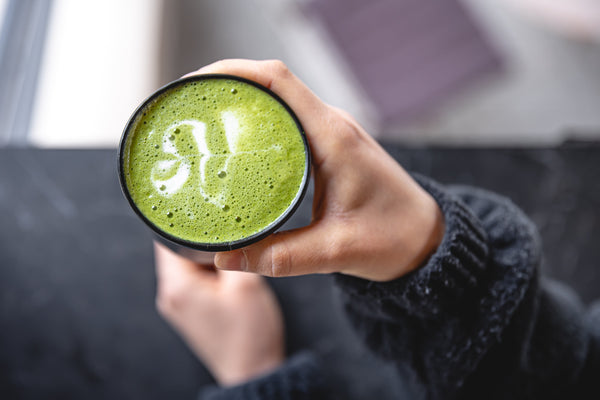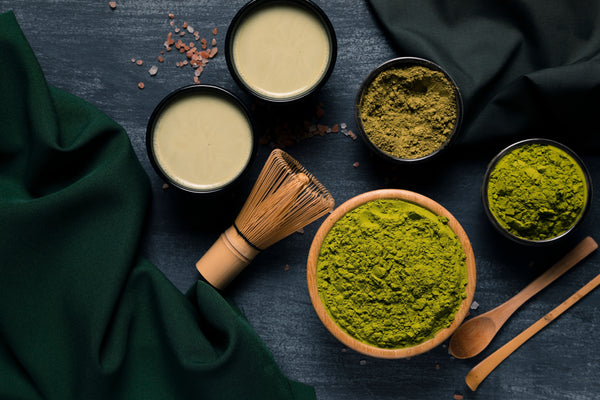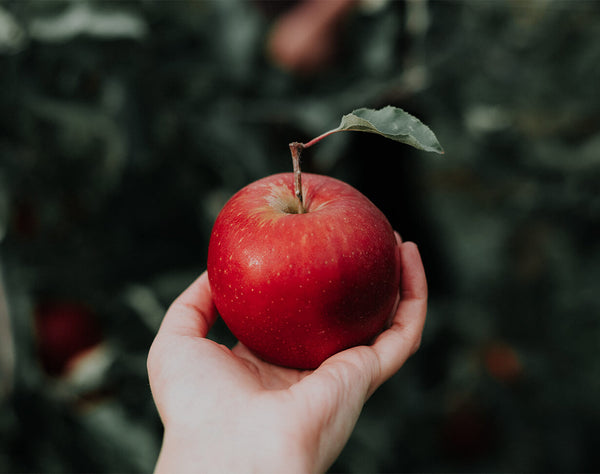4 Ways Matcha is Good For Health
At a time and age, when the greener your food, the healthier you are considered to be, matcha’s popularity has grown exponentially, finding its way from health stores to coffee shops- served in the form of teas, lattes, smoothies, bakery products, desserts, and the like. Read our blog, 7 Delicious Recipes to Use Matcha!, to know the myriad dishes one can make with matcha. Matcha is known for its many health benefits. In this blog, let’s look at what matcha is, how it differs from green tea, and the different ways in which it is good for health.
What Is Matcha?
Matcha is a type of green tea. The bright green matcha powder which is used to make the tea is made by grinding young tea leaves. This powder is then whisked with hot water to prepare a cup of hot matcha tea, quite unlike the regular green tea, which is prepared by infusing the tea leaves in hot water and then removing them once they’re properly steeped. However, many people argue that the practice of brewing a cup of tea in this manner takes away most of the nutrients and antioxidants that the tea leaves originally contain. Preparing matcha tea using the powder means it is an opportunity for one to drink the green tea with the leaves and eventually the essential nutrients intact.
Quite like green tea, matcha is obtained from the Camellia sinensis plant. However, what makes it more nutritious than regular green tea is the way in which it is grown. Matcha is grown with its tea plants covered 20-30 days before they are harvested to protect them from direct exposure to sunlight. The ‘shade’ that is created to protect the plant helps the chlorophyll production to increase and amino acid content to bolster, thereby enhancing the overall nutrient profile of the plant. This also gives the leaves a dark green colour, which reflects its rich chlorophyll content. Once the tea leaves are harvested, the stems and veins of the plant are removed and the leaves are ground to make matcha powder, which is then used to prepare different things, right from tea, smoothies, juice to desserts.
Health Benefits of Matcha
Research has unearthed several health benefits of matcha. Given below are 4 different ways in which it is good for health.
● Rich in antioxidants
Matcha is rich in natural antioxidants called catechins, which are compounds that help to neutralize harmful free radicals in the body, which are responsible for oxidative stress and damaged cells and chronic inflammation in the body- reasons that contribute to the genesis of chronic diseases in the body. When the matcha powder is added to hot water to prepare matcha tea, it will invariably contain more catechins and antioxidants than regular green tea which is made by steeping green tea leaves in water.
Green tea usually contains high concentrations of four primary types of catechins-epigallocatechin gallate (EGCG), epicatechin (EC), epicatechin gallate (ECg), and gallocatechin (GC). Given that matcha tea is even more potent and high in nutrients than regular green tea, they have a high concentration of the aforementioned catechins.
In fact research states the catechins present in matcha is up to 137 times greater than the other types of green tea. Research shows that the catechin, epigallocatechin gallate (EGCG) aids in reducing inflammation, stimulating weight loss, improving heart health and cognition, among other things.
● Aids In Weight Loss
Metabolism plays a vital role in the weight loss process. If you have a weak metabolism, then you won’t be able to lose weight effectively even if you consume less food. Matcha tea helps you to activate a slackening metabolism. The catechins present in matcha tea help to regulate one’s metabolism after some sort of physical activity.
The catechins present in this tea also helps in increasing the body’s thermogenesis 10% to almost 40%, which helps to break down large fat molecules in the body into smaller triglycerides that are either used up or excreted by the body. Thus drinking matcha green tea, especially after a workout, aids in burning fat and increasing endurance.
Matcha also contains an essential antioxidant known as l-theanine, which assists in controlling and regulating the stress hormone-cortisol. Cortisol tends to stimulate the carbohydrate and fat metabolism in the body. While this works exceptionally well as a survival strategy, its drawback is that it tends to increase the appetite, especially cravings for fatty, salty and sweet food. Consuming too much of these foods will automatically result in weight gain. Drinking matcha tea regularly will not only help to manage and regulate cortisol levels, but also suppress hunger pangs, thereby controlling one’s appetite and managing the body weight.
● Improves heart health
The catechins present in matcha tea also helps to regulate blood pressure and cholesterol levels in the body, all of which contribute to a healthy heart. Studies show that drinking matcha or green tea regularly is linked to a reduced risk of heart disease or stroke. Having matcha or green tea along with a healthy balanced diet and an active lifestyle is likely to enhance one’s heart health and protect it from the risk of chronic ailments.
● May Help Reduce The Risk Of Cancer
Given that matcha is rich in antioxidants and high concentrations of catechins like epigallocatechin gallate (EGCG) that have been scientifically proven to offset the impact of oxidative stress in the body, including at a cellular level, it has the potential to protect the body even against cancer. There are test tube studies that show how the EGCG component present in green tea helped kill off prostate cancer cells, and reduce the risk of skin, lung, and liver cancer. However, more human studies are required to fully determine its efficacy in managing or reducing the risk of cancer.
Furthermore, there’s ample research available, which shows how matcha tea aids in regulating sugar levels, detoxifying the liver, improving skin health, cognition, energy levels and regulating hormones among other things.
Wrapping Up
Matcha may come from the same plant as green tea, but it is way more healthy than the regular green tea we drink. It is packed with a more concentrated and potent amount of antioxidants and plant compounds. Additionally, the entire leaf is used to prepare the powder, which is used to prepare matcha tea or other matcha-related delicacies.
Matcha tea, which is an integral part of the traditional Japanese tea ceremony, is easy to prepare and can be easily incorporated into your daily routine. Now this process has been further simplified by Wellbeing Nutrition (WBN), which has come up with its latest product-Japanese Ceremonial Matcha Green Tea in the form of effervescent tablets. Yes, now say bye bye to matcha tea in the form of messy powder or tea bags and yes to the tea in the form of water soluble tablets. All you need to do is drop a tablet in a glass of water and you’re good to go! Sourced fresh from Shizuoka, Japan, these tablets contain the best of organically grown Tencha green tea leaves, which have been stone ground to perfection. So what are you waiting for? Hurry up and get yourself a tube of WBN’s Japanese Ceremonial Matcha Green Tea to give traditional matcha tea a try in a totally conventional format.
Research
- Weiss DJ, Anderton CR. Determination of catechins in matcha green tea by micellar electrokinetic chromatography. J Chromatogr A. 2003 Sep 5;1011(1-2):173-80. doi: 10.1016/s0021-9673(03)01133-6. PMID: 14518774. (https://pubmed.ncbi.nlm.nih.gov/14518774/)
- Nagle DG, Ferreira D, Zhou YD. Epigallocatechin-3-gallate (EGCG): chemical and biomedical perspectives. Phytochemistry. 2006;67(17):1849-1855. doi:10.1016/j.phytochem.2006.06.020. (https://www.ncbi.nlm.nih.gov/pmc/articles/PMC2903211/)
- Kochman J, Jakubczyk K, Antoniewicz J, Mruk H, Janda K. Health Benefits and Chemical Composition of Matcha Green Tea: A Review. Molecules. 2020;26(1):85. Published 2020 Dec 27. doi:10.3390/molecules26010085. (https://www.ncbi.nlm.nih.gov/pmc/articles/PMC7796401/)
- Weiss DJ, Anderton CR. Determination of catechins in matcha green tea by micellar electrokinetic chromatography. J Chromatogr A. 2003 Sep 5;1011(1-2):173-80. doi: 10.1016/s0021-9673(03)01133-6. PMID: 14518774. (https://pubmed.ncbi.nlm.nih.gov/14518774/)
- Matcha Green Tea Drinks Enhance Fat Oxidation During Brisk Walking in Females, International Journal of Sport Nutrition and Exercise Metabolism, Mark Elisabeth Theodorus Willems, Mehmet Akif Şahin, Matthew Cook, International Journal of Sport Nutrition and Exercise Metabolism, 2018, DOI:10.1123/ijsnem.2017-0237. (https://www.researchgate.net/publication/322588491_Matcha_Green_Tea_Drinks_Enhance_Fat_Oxidation_During_Brisk_Walking_in_Females)
- Mousavi A, Vafa M, Neyestani T, Khamseh M, Hoseini F. The effects of green tea consumption on metabolic and anthropometric indices in patients with Type 2 diabetes. J Res Med Sci. 2013;18(12):1080-1086. (https://www.ncbi.nlm.nih.gov/pmc/articles/PMC3908530/)
- Unno K, Furushima D, Hamamoto S, et al. Stress-Reducing Function of Matcha Green Tea in Animal Experiments and Clinical Trials. Nutrients. 2018;10(10):1468. Published 2018 Oct 10. doi:10.3390/nu10101468. (https://www.ncbi.nlm.nih.gov/pmc/articles/PMC6213777/)
- Deka A, Vita JA. Tea and cardiovascular disease. Pharmacol Res. 2011;64(2):136-145. doi:10.1016/j.phrs.2011.03.009. (https://www.ncbi.nlm.nih.gov/pmc/articles/PMC3123419/)
- Bonuccelli G, Sotgia F, Lisanti MP. Matcha green tea (MGT) inhibits the propagation of cancer stem cells (CSCs), by targeting mitochondrial metabolism, glycolysis and multiple cell signalling pathways. Aging (Albany NY). 2018;10(8):1867-1883. doi:10.18632/aging.101483. (https://www.ncbi.nlm.nih.gov/pmc/articles/PMC6128439/)












